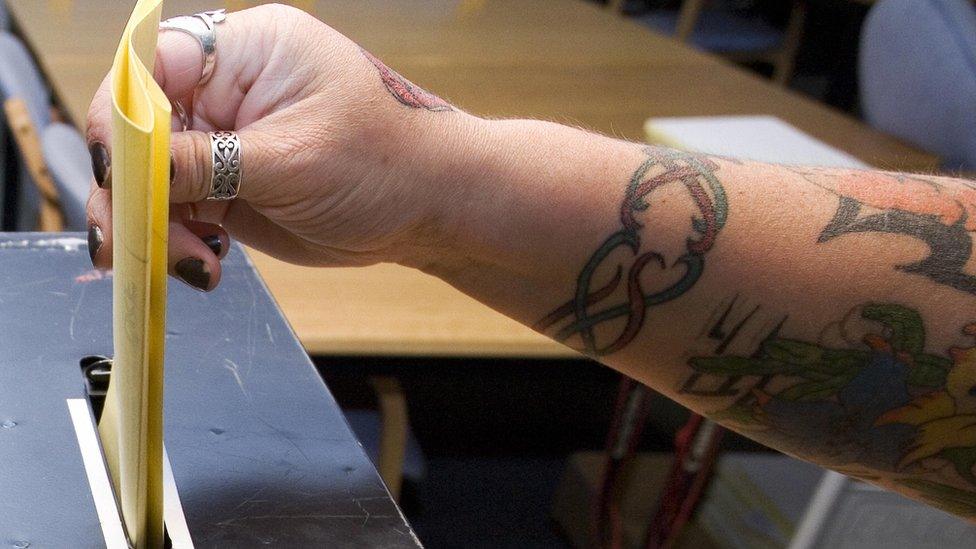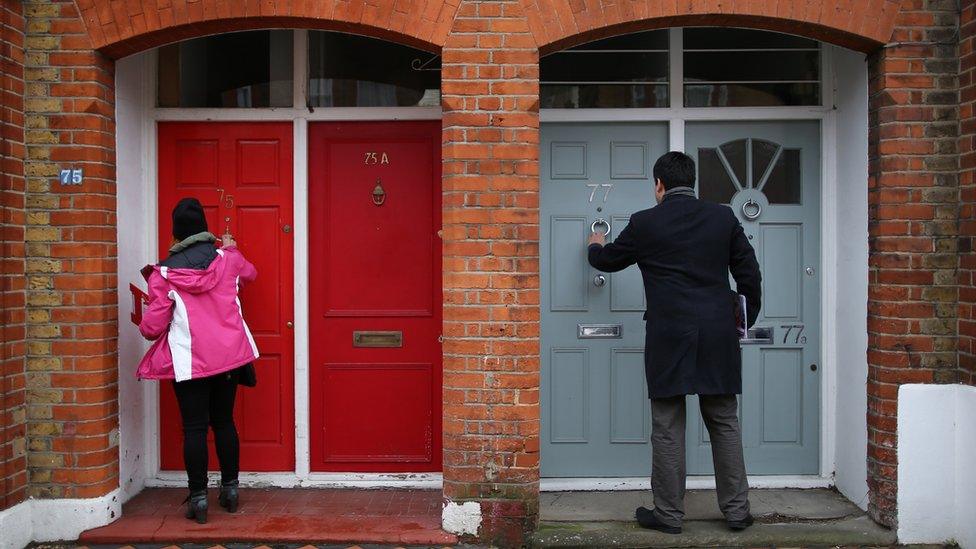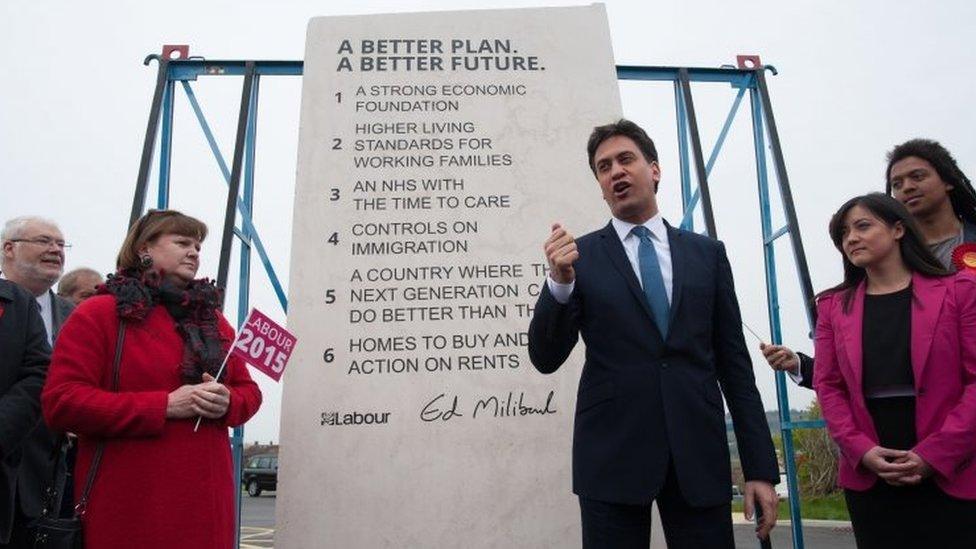How will history remember the 2015-17 Parliament?
- Published
- comments
Prime Minister David Cameron says he will stand down
In the tradition of the Good Parliament, the Long Parliament, the Addled Parliament and the Cavalier Parliament, will history remember the short, but eventful parliament of 2015-17?
Probably as the Brexit Parliament… its central event was the EU Referendum and its spectacular fallout - and there can be few moments in history when the political scene has transformed so convulsively and completely.
Rewind, for a moment, to 9 May, 2015. David Cameron and George Osborne were all-conquering - they had sloughed off the constraints of coalition and headed the first Conservative majority government to take office since 1992.
Labour and the Lib Dems were in disarray and faced leadership contests, and only the new phalanx of SNP MPs - now the third party in the Commons - looked confident and organised.
What you need to know about the general election
How much do political parties know about you?
Why wasn't 2015 the 'Brexit election'?
With a majority of just 12, the government had to tread carefully - especially on euro issues. There was no way the prime minister could resile from his manifesto commitment to renegotiate the terms of Britain's EU membership and bring home new controls on immigration.
But right from the start, Tory strategists knew that the party faced what might be a devastating civil war between its pro-EU and pro-Brexit wings.
Prime Minister Theresa May said she wanted to "build a better Britain"
Highlights of the arguments and campaigning ahead of the UK voting in the EU referendum
The referendum result forced David Cameron to resign, and a brief, but vicious smack down followed. Several cabinet ministers who had looked set to remain in office for a decade were suddenly out on their ears.
There was a little sniping from the dispossessed, but the Conservatives displayed their usual instinct for unity - an instinct summed up by the veteran pro-Remain former Foreign Office minister Alistair Burt, who told the Commons on 1 February: "As a confirmed remainer and supporter of the EU, I do not want the next generation of Conservative MPs to have the blight of this argument dogging them, their associations, their members and their voters in the way it has dogged us. It has soured friendships, deepened bitterness and damaged relationships - I swore at a mate in the Tea Room, and I am sorry."
Theresa May's new government was forced by a court action to bring in a bill to begin the process of leaving the EU - the 133-word European Union (Notification of Withdrawal) Bill. It was passed, clean and un-amended by the Commons, but amended twice by the Lords, before they backed down when the Commons refused to accept the changes they had made.
Jeremy Corbyn won the contest in the first round of voting, with 251,417 votes
Jeremy Corbyn after 2016 contest: Let's wipe that slate clean, from today, and get on with the work we have got to do as a party together
For all the sound and fury, and baleful warnings that pro-Remain peers would "block Brexit" the government got the result it wanted on time and with no serious inconvenience along the way.
Labour's internal troubles were obvious from the moment Jeremy Corbyn took office…. It was not just the doomed Owen Smith leadership challenge that laid bare the internal rivalries of the Labour right while actually strengthening the leader's hand.
There were also the silent ranks of MPs behind him at PMQs, the constant churn through the shadow cabinet and front bench, the preference of many MPs for jobs on the committee corridor or big-city mayoralties - or even outside politics altogether.
Angus Robertson asks the prime minister if he is "running away" from a previous pledge to take part in a TV debate
There were splits on everything from economic policy to Brexit, but perhaps the most dramatic manifestation of all this came in the December 2015 Syria vote, when David Cameron sought Commons approval to join the military action against ISIS in Syria, which Jeremy Corbyn opposed, but his shadow foreign secretary Hilary Benn (in what was probably THE speech of the Parliament) supported.
The SNP meanwhile were enjoying their new status as the third party in the Commons - gleefully turfing the Lib Dems out of the offices they had enjoyed for decades, and making good use of their new prominence in debates and question times - with their Westminster leader, Angus Robertson emerging as the classiest performer at PMQs.
In the 2015 Parliament, the SNP seemed to defy the normal laws of politics, running a focused, disciplined and very smart political operation, closely coordinated with their Holyrood leadership.
'Tough task'
The Westminster press corps never really penetrated their shell; there was no hint of internal dissent or factional rivalry as they relentlessly used their new prominence to paint Westminster as corrupt and antiquated, and to push to make the case for independence at every opportunity, while taking pot-shots at Labour at every opportunity. Their natural allies, Plaid Cymru, did much the same, and were probably boosted by association.
The Lib Dems began the Parliament decimated and demoralised - just barely visible on good days and missing from debates a lot of the time. Like generations of his predecessors, their new leader, Tim Farron, has had a rough ride in the Commons, but Brexit seems to have revived them somewhat, with Nick Clegg in particular shaking off his post-election melancholy.
Douglas Carswell gets a one word answer when he asks David Cameron about his future.
David Cameron is asked about the past progressive tense and modal verbs by Caroline Lucas.
Perched uneasily next to them in the Commons benches were the Northern Ireland DUP, whose main role in the last Parliament was as the go-to source of extra votes when the government's narrow majority was under threat. They have enjoyed huge leverage since 2010, and have played their hand well.
Then we had the one-person parties - Douglas Carswell (sometime of UKIP) and the Greens' Caroline Lucas. Being the only Commons voice for a party with national pretentions is a tough task. Ms Lucas has been an effective performer, and has managed to use the House as a platform to make her presence - and her party's - felt. She has been helped by Commons rules which require cross-party support for backbench debates, making her a sought-after ally for all kinds of campaigns.
Mr Carswell has been more pre-occupied with the internal politics of his adopted party. How antiseptic that statement seems, set against the brutal party infighting which marked his sojourn in UKIP. But (see previous blogpost) he can leave Westminster having secured his ultimate political aim, and able to at least claim that his faction-fighting inside UKIP made the referendum victory possible.
Joint inquiries
Of course the parties are just one dimension of Westminster life. The two years of the 2015-17 Parliament also saw an impressive flowering of the select committees, where cross-party working is the order of the day.
At times they have exerted real leverage over governments - there was the health committee's push for a sugary drinks tax to tackle obesity, under the leadership of Dr Sarah Wollaston. There was the astounding sight of Prime Minister David Cameron having to publicly court the chair of the Foreign Affairs Committee, Crispin Blunt, when he sought Commons approval to join the military action against ISIS in Syria. And there was a new trend to joint working, with several committees joining forces to address a series of issues which crossed departmental boundaries.
There were joint inquiries into Supported Housing (Work and Pensions and Communities and Local Government); Mental Health in Schools (Education and Health); Improving Air Quality (Environment Food and Rural Affairs, Environmental Audit Committee, Health, and Transport Committees); Competitiveness (Education and Business), and, most spectacularly, there was the joint Work and Pensions and Business inquiry into the collapse of BHS.
There was also cooperation between select committee chairs to push causes on which they agreed, most notably the close coordination between Sarah Wollaston, Clive Betts of the Communities and Local Government Committee, and the Public Accounts Committee chair, Meg Hillier, over funding for the NHS and social care.
Speaker John Bercow announces that clerks in the House of Commons will no longer have to wear wigs
The Speaker told the House of Commons that MPs should follow the example of Ken Clarke
John Bercow says the Lib Dem leader may be "irritating" to some Conservative backbenchers
The other continuing trend of the 2015 Parliament was more urgent questions and more emergency debates, as Speaker Bercow continued to facilitate MPs in jerking the chain of ministers. In this respect the Commons intakes of 2010 and 2015 hardly know they're born. The days when urgent questions were rarer than panda cubs, and emergency debates were merely a theoretical possibility, are long gone. A pro-active speaker has utterly changed the climate of the Commons, speeding up question times, so more voices are heard, and paying less regard to the rigid seniority system, which set the pecking order in debates. But John Bercow's term in the chair is now certainly closer to its end than its beginning.
This has also been a more visibly emotional parliament. There was an early moment of tragedy when the former Lib Dem Leader Charles Kennedy - who lost his seat at the election - died suddenly at his home, Then came the brutal murder of the Labour MP Jo Cox, and the terror attack of March 2017.
Jeremy Corbyn tribute to Jo Cox: 'We have lost one of our best'
Each of these events led to emotional occasions in the Commons, and produced a sense of a political community rallying round. And beyond those moments, this was a Parliament where MPs talked openly about their experiences of stillbirth and infant death, depression, alcoholism and the suicide of a relative. Some of these speeches - from Antoinette Sandbach and Vicky Foxcroft, for example - had a shattering impact on the MPs in the chamber and the wider public.
One of the biggest changes has been the growing audience for Parliament. A few centuries ago, it was illegal to report debates in the Commons - now there is a substantial and growing audience for BBC Parliament and Westminster's own online service, external which allows the public to watch not just the main chamber but committee and Westminster Hall proceedings, too.
The 21st century audience does not have to rely on next-day reports of debates, and committee hearings, it can watch and comment in real time, replay and analyse every word and facial expression and rebroadcast its favourite moments.
Some MPs are becoming adept at creating viral social media moments - as when the SNP contingent began to hum the EU anthem "Ode to Joy" during the final votes on the bill to trigger Article 50, attracting a rebuke from deputy speaker Lindsay Hoyle.
If I have one prediction for the next parliament, it is that more MPs will realise that there is now a very big spectators' gallery out there - and more and more of them will start to play to it.
- Published2 June 2017

- Published9 May 2017

- Published8 May 2017
